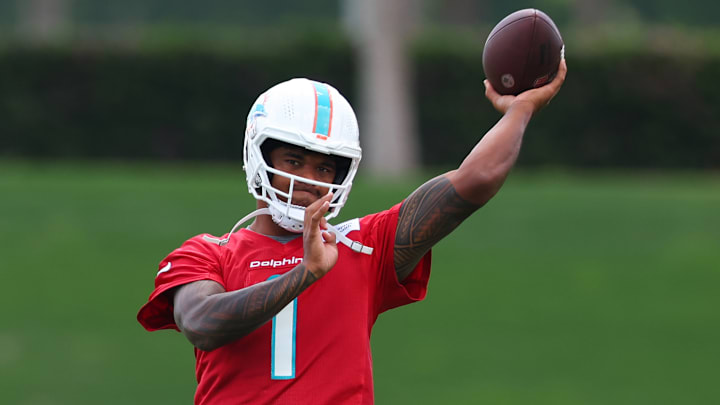Tua Tagovailoa is entering the final guaranteed year of his contract with the Miami Dolphins. He is one of several extension-eligible players around the league, but few stick out more than a franchise quarterback. Tagovailoa is coming off the best season of his career, and one would expect him to be compensated accordingly.
On the surface, Miami has every reason to hand Tagovailoa the sort of massive extension that has become customary for elite quarterbacks. He led the NFL in passing yards (4,624) last season, averaging 8.3 yards per attempt and completing 29 touchdown passes. The Dolphins collectively ranked No. 1 in passing yards and No. 1 in total offense, running (and passing) circles around the competition.
A dig beneath the surface, however, reveals some concerns. The Dolphins' success is rooted largely in Mike McDaniel and his inventive scheme, which sets up Tagovailoa for quick progressions and efficient passes. The Dolphins are equipped with two of the NFL's fastest wideouts in Tyreek Hill and Jaylen Waddle. Oftentimes, Miami's explosive plays are created after the catch. Tagovailoa can lob a nice vertical bomb from time to time, but he's generally working close to the line of scrimmage and operating within his scheme.
There is a reason Miami hasn't just handed Tagovailoa $300 million. This is a distraction that could linger because the Dolphins aren't fully confident in the 26-year-old's ability to win at the highest level.
Sports Illustrated's Matt Verderame spoke with NFL execs about Miami's impending contract decision. There were plenty of insightful comments.
NFL execs weigh in on Tua Tagovailoa's complex contract situation with Dolphins
Right now, Tagovailoa is set to make $23.2 million next season. From there, Miami has the option to extend him or use the franchise tag (roughly $40 million in the 2025 campaign). If the Dolphins opt to tag Tagovailoa, the same dilemma unfolds next season. Extend him, or use a second franchise tag — a roughly 20 percent increase over the 2025 number.
So, in theory, the Dolphins can drag this out and really take their time. Tagovailoa has a long injury history, which includes multiple concussions, and the Dolphins haven't performed in the postseason since Tagovailoa's arrival. There is no doubt about Miami's ability to stack regular season wins, but can Tagovailoa actually handle pressure and execute advanced passes in the playoffs? We haven't seen it yet. Blame weather, blame whatever, but it hasn't happened yet.
One NFL coordinator offered SI a rather damning portrait of the Dolphins' offensive hierarchy.
"The best way to look at it is, you prepare for the speed at skill positions and Mike McDaniel, and then Tua… He doesn’t like to get hit or read coverage. When is he at his best? RPOs and the quick game. Next question to ask yourself is how many quarterbacks would you take before him."
If Tagovailoa is the third, fourth, or fifth priority on the opposing game plan, it speaks to how reliant the QB is on his system. Folks tend to throw around the phrase "system quarterback" as an insult, but Tagovailoa is probably the best system QB in the NFL. He has mastered the Dolphins' scheme. He gets passes off quickly, puts the pigskin in his best playmakers' hands, and operates on a telekinetic wavelength with McDaniel. We cannot overstate the importance of a coach and QB being on the same page.
That said, if Tagovailoa's value is rooted entirely in his ability to execute a scheme, rather than his ability to create outside the scheme and produce results with his individual talent, it's fair to question his true worth as a free agent.
A front office person told Sports Illustrated that Tagovailoa should be paid as a good, not great quarterback.
"[The Dolphins] should pay him [between the] fifth- and 10th-ranked quarterbacks. He has some talent and fits the system, but there’s no real upside and the medical is scary. He will only be as good as the players around him.”
Again, there just isn't much confidence in Tagovailoa's ability to elevate those around him. If anything, he is elevated by his teammates. By that logic, there are plenty of replacement-level QBs who could guide the Dolphins' offense to similar heights. There's something to be said for familiarity and continuity, so the Dolphins can't just let Tagovailoa walk for nothing. But he's not going to be paid like the best at his position.
The range outlined above falls between $180 and $248 million total. That's a wide range, and it would ultimately come down to how many years Tagovailoa gets on his contract and what the guarantee structure is. Unless, of course, Miami decides to stretch it out and weaponize those franchise tags, as one former general manager believes they should.
"I would definitely stretch it out. I couldn’t pay him the $50 million [per year] at this stage with the information we have. Play this year out, then tag him next year if you have to. Just because he played one full season, that doesn’t alleviate everybody’s doubts about durability. Plus, I felt like at the end of last year his talents grew a wart or two."
That is probably the ideal approach, assuming Tagovailoa doesn't get impatient and raise hell in the locker room. There's no telling how Tagovailoa and his representation would respond to stalled contract negotiations, but if the Dolphins can kick the multi-year extension down the road, that is preferable to an immediate deal. It allows for Tagovailoa to prove his mettle. And, if Tagovailoa doesn't prove his mettle, it allows for better alternatives to manifest.
In short, we don't really know what is going to happen with Tagovailoa. All we know is that the Dolphins are stuck between a rock and a hard place until the Alabama product mounts a deep postseason run.
